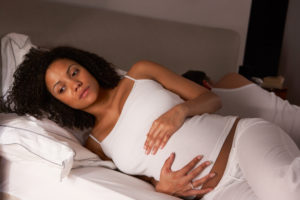When you buy through our links, we may earn a commission. Products or services may be offered by an affiliated entity. Learn more.
Sleeping While Pregnant: Third Trimester
The third trimester of pregnancy brings a host of sleep-related changes. Weight gain and pressure of the growing fetus can have a direct impact on muscles, joints, and blood flow.
If you are experiencing sleep difficulties during the third trimester of pregnancy, there are ways to improve your sleep quality. We take a closer look at the factors that influence third trimester sleep, including conditions like sleep apnea and restless legs syndrome, and evaluate the best third trimester pregnancy sleeping positions.
How Does Sleep Change in the Third Trimester?
For many people, the third trimester is the most difficult stage of pregnancy, bringing back pain, heartburn, sleep apnea, and other uncomfortable symptoms. It can be more difficult to get quality sleep , and it is common to experience daytime fatigue as a result of your changing body.
Back Pain and General Discomfort
It is estimated that 2 in 3 pregnant people suffer from lower back pain and sore muscles during the third trimester, which in turn causes sleep disturbances. Pregnant people with higher levels of depression or anxiety typically describe their back pain as more severe.
Is Your Troubled Sleep a Health Risk?
A variety of issues can cause problems sleeping. Answer three questions to understand if it’s a concern you should worry about.
Third Trimester Insomnia
Insomnia strikes roughly two-thirds of people during late pregnancy. Principal drivers of insomnia in pregnant people include anxiety, depression, disturbed dreams, nighttime awakening, fetal kicking and movement, and physical discomfort. Frequent bathroom breaks due to overactive kidneys and the weight of the uterus against the bladder can also disrupt sleep.
Snoring and Sleep Apnea
A significant number of people develop snoring and sleep apnea during pregnancy. Though often benign, this may be a warning sign of a more severe condition. Research shows that snoring is correlated with high blood pressure and preeclampsia , while sleep apnea may increase the risk of maternal morbidity . Sleep apnea also appears to be correlated with gestational diabetes .
Leg Cramps and Restless Legs Syndrome
Research shows that as many as 1 in 3 people have restless legs syndrome in the third trimester, characterized by uncomfortable sensations that provoke an irresistible urge to move the legs. Restless legs syndrome appears more when the body is at rest and can make it virtually impossible to get to sleep. The third trimester also brings nighttime leg cramps for many people.
Heartburn
As the digestive system slows down in late pregnancy, many expectant parents develop heartburn. This uncomfortable condition involves acid rising back up through the esophagus, causing a burning sensation in the chest.
Help Your Baby Sleep Better With Pediatric Sleep Coaching

our partner at sleepdoctor.com
Learn More“Life-changing! My anxiety about my son’s sleeping habits were immediately reduced after talking to Sara. She went above and beyond to tailor a schedule to our goals, answer our questions, keep us on track, and check in to encourage us when we just thought we couldn’t do it anymore.”
Rachael B. – Verified Customer
Why Sleep Is Important During Your Third Trimester
Poor sleep during the third trimester is associated with a host of problems, including preeclampsia and preterm birth . Pregnant people who experience insomnia or habitual snoring appear to be more likely to give birth to a baby that is too large or too small for gestational age . Research also shows that women who experience sleep problems in late pregnancy have longer labors and are more likely to need a cesarean section .
Poor sleep also appears to be linked to a higher risk of gestational diabetes mellitus, a condition that can cause health complications for both the fetus and the pregnant parent. In turn, better sleep is associated with more successful breastfeeding and a lower chance of depression during pregnancy and postpartum.

What Is the Best Third Trimester Pregnancy Sleeping Position?
Research shows that the best sleeping position in the third trimester is on the left side, with your legs slightly tucked up toward your chin. This position improves blood flow to the uterus, and helps deliver nutrients and oxygen to the fetus. Improved circulation and kidney function also reduces swelling, hemorrhoids, and varicose veins in the legs. People with severe swelling may try propping the legs up higher than the belly.
Why Should You Avoid Sleeping on Your Right Side During the Third Trimester?
Sleeping on your right side during the third trimester puts the weight of the uterus on your liver, and sleeping on your back can block the inferior vena cava and cut off blood flow. Sleeping on your stomach is virtually impossible because of the baby’s size. It is okay to briefly flip into these positions, but try not to spend too long in them.
Sleeping on your left side can be difficult if you are normally a stomach or back sleeper. A pillow between the legs, tucked into the small of the back, or propping up your belly may ease the strain and help you feel more comfortable. A strategic pillow wedged behind may also help you adjust to side sleeping. Some manufacturers make purpose-built positional therapy devices, pregnancy wedges, and body pillows that are designed with your needs in mind.
Sleeping Products to Help With Third Trimester Sleep
Most sleep medications are generally not recommended for pregnant people, but there are still many products that can aid in improving your sleep. A white noise machine, meditation app, or lavender scent may help lull you to sleep, while high-quality pillows and mattresses are essential to make sure you are properly supported.
Through a combination of sleep hygiene, vitamin and mineral supplements, and safer sleeping positions, pregnant people can improve the quality and quantity of their sleep. Remember to always check with your health care provider before changing your routine or starting a new medication, and inform them immediately if you have symptoms that cause discomfort or pain.
How to Sleep Better During Your Third Trimester
People who suffer from specific pregnancy-related sleep disorders should prioritize reducing symptoms. This may mean doing some light stretching before bed or taking mineral supplements to prevent leg cramps and restless legs syndrome. Heartburn can be avoided by sleeping on your left side, eating smaller meals, not eating right before bed, and avoiding certain trigger foods such as spicy or fatty foods.
General sleep hygiene tips apply to pregnant people as well. Try to set a regular bedtime and create a dark, cool, and peaceful sleep environment. Wind down before bedtime with a warm bath or a calming cup of herbal tea, and avoid caffeine, stimulants, and electronic screens in the hours before bedtime.
Pregnant people who struggle with anxiety may find it helpful to join a yoga class or parenting class for a supportive group environment. Regular exercise is recommended for pregnant people and is an important part of sleep hygiene, but avoid exercising too late in the day as the body needs time to wind down before sleep. Yoga or relaxation exercises, a prenatal massage, and relaxing music are some ways to prepare the body for sleep.
As the uterus grows, you may experience shortness of breath, which can be alleviated by propping up your head while you sleep. Rolling over onto your side generally opens the airway and eases snoring. Those with sleep apnea symptoms should consult with their health care provider for treatment.
Mental Health Tips
Your bed should be a serene place reserved for sleep and sex. If you have been lying in bed for a while and cannot fall asleep, get up and do a calming activity such as reading a book or taking a bath. Lying in bed fretting about getting to sleep is counterproductive and may make you associate bedtime with stress.
One study found that people were more likely to experience postpartum depression if they worried excessively about sleep in the third trimester, regardless of the actual quality of their sleep. Be aware of the importance of sleep, but try not to let it become a major source of stress. Promising evidence suggests that a combination of cognitive behavioral therapy coupled with sleep hygiene practices may be an effective way to help with sleep problems in the third trimester.
Research also suggests that treating depressive symptoms may help improve sleep quality and reduce daytime fatigue. It is normal to feel anxious and excited about the impending childbirth, and it is important to discuss these fears with your support system.
Medical Disclaimer: The content on this page should not be taken as medical advice or used as a recommendation for any specific treatment or medication. Always consult your doctor before taking a new medication or changing your current treatment.

Still have questions? Ask our community!
Join our Sleep Care Community — a trusted hub of sleep health professionals, product specialists, and people just like you. Whether you need expert sleep advice for your insomnia or you’re searching for the perfect mattress, we’ve got you covered. Get personalized guidance from the experts who know sleep best.
References
15 Sources
-
Mindell, J. A., Cook, R. A., & Nikolovski, J. (2015). Sleep patterns and sleep disturbances across pregnancy. Sleep medicine, 16(4), 483–488.
https://pubmed.ncbi.nlm.nih.gov/25666847/ -
Winkelman, J. W. (2023, January 25). Overview of the treatment of insomnia in adults. In R. Benca (Ed.). UpToDate.
https://www.uptodate.com/contents/overview-of-the-treatment-of-insomnia-in-adults?search=insomnia%20pregnancy&source=search_result&selectedTitle=1~150&usage_type=default&display_rank=1#H2236812628 -
Reichner C. A. (2015). Insomnia and sleep deficiency in pregnancy. Obstetric medicine, 8(4), 168–171.
https://pubmed.ncbi.nlm.nih.gov/27512475/ -
Facco, F. L., Parker, C. B., Reddy, U. M., Silver, R. M., Koch, M. A., Louis, J. M., Basner, R. C., Chung, J. H., Nhan-Chang, C. L., Pien, G. W., Redline, S., Grobman, W. A., Wing, D. A., Simhan, H. N., Haas, D. M., Mercer, B. M., Parry, S., Mobley, D., Hunter, S., Saade, G. R., … Zee, P. C. (2017). Association between sleep-disordered breathing and hypertensive disorders of pregnancy and gestational diabetes mellitus. Obstetrics and Gynecology, 129(1), 31–41.
https://pubmed.ncbi.nlm.nih.gov/27926645/ -
Louis, J. M., Mogos, M. F., Salemi, J. L., Redline, S., & Salihu, H. M. (2014). Obstructive sleep apnea and severe maternal-infant morbidity/mortality in the United States, 1998-2009. Sleep, 37(5), 843–849.
https://pubmed.ncbi.nlm.nih.gov/24790262/ -
Reutrakul, S., Zaidi, N., Wroblewski, K., Kay, H. H., Ismail, M., Ehrmann, D. A., & Van Cauter, E. (2013). Interactions between pregnancy, obstructive sleep apnea, and gestational diabetes mellitus. The Journal of clinical endocrinology and metabolism, 98(10), 4195–4202.
https://pubmed.ncbi.nlm.nih.gov/23966237/ -
Dunietz, G. L., Lisabeth, L. D., Shedden, K., Shamim-Uzzaman, Q. A., Bullough, A. S., Chames, M. C., Bowden, M. F., & O’Brien, L. M. (2017). Restless legs syndrome and sleep-wake disturbances in pregnancy. Journal of Clinical Sleep Medicine, 13(7), 863–870.
https://pubmed.ncbi.nlm.nih.gov/28633715/ -
Felder, J. N., Baer, R. J., Rand, L., Jelliffe-Pawlowski, L. L., & Prather, A. A. (2017). Sleep Disorder Diagnosis During Pregnancy and Risk of Preterm Birth. Obstetrics and gynecology, 130(3), 573–581.
https://journals.lww.com/00006250-201709000-00012 -
Liu, H., Li, H., Li, C., Chen, L., Zhang, C., Liu, Z., Wu, Y., & Huang, H. (2019). Associations between maternal sleep quality throughout pregnancy and newborn birth weight. Behavioral Sleep Medicine, 19(1), 57–69.
https://pubmed.ncbi.nlm.nih.gov/31830816/ -
Lee, K. A., & Gay, C. L. (2004). Sleep in late pregnancy predicts length of labor and type of delivery. American journal of obstetrics and gynecology, 191(6), 2041–2046.
https://linkinghub.elsevier.com/retrieve/pii/S0002937804005745 -
Tsai, S. Y., Lin, J. W., Wu, W. W., Lee, C. N., & Lee, P. L. (2016). Sleep Disturbances and Symptoms of Depression and Daytime Sleepiness in Pregnant Women. Birth (Berkeley, Calif.), 43(2), 176–183.
https://onlinelibrary.wiley.com/doi/10.1111/birt.12215 -
Rossi, A., Cornette, J., Johnson, M. R., Karamermer, Y., Springeling, T., Opic, P., Moelker, A., Krestin, G. P., Steegers, E., Roos-Hesselink, J., & van Geuns, R. J. (2011). Quantitative cardiovascular magnetic resonance in pregnant women: Cross-sectional analysis of physiological parameters throughout pregnancy and the impact of the supine position. Journal of Cardiovascular Magnetic Resonance, 13(1), 31.
https://pubmed.ncbi.nlm.nih.gov/21708015/ -
Lee, K. A., Zaffke, M. E., & Baratte-Beebe, K. (2001). Restless legs syndrome and sleep disturbance during pregnancy: The role of folate and iron. Journal of Women’s Health & Gender-Based Medicine, 10(4), 335–341.
https://pubmed.ncbi.nlm.nih.gov/11445024/ -
Bei, B., Milgrom, J., Ericksen, J., & Trinder, J. (2010). Subjective perception of sleep, but not its objective quality, is associated with immediate postpartum mood disturbances in healthy women. Sleep, 33(4), 531–538.
https://pubmed.ncbi.nlm.nih.gov/20394323/ -
Lee, K. A., & Gay, C. L. (2017). Improving sleep for hospitalized antepartum patients: A non-randomized controlled pilot study. Journal of Clinical Sleep Medicine, 13(12), 1445–1453.
https://pubmed.ncbi.nlm.nih.gov/29117884/














